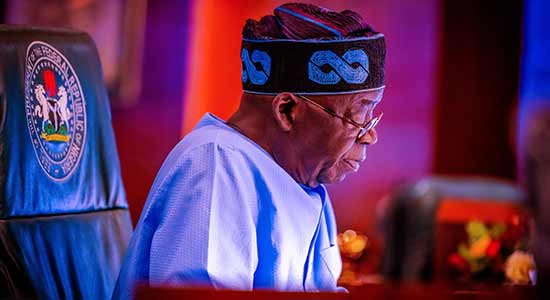EDITORIAL: Don’t attack critics; just fix the economy
The presidency and the ruling All Progressives Congress (APC) have continued to blame the opposition and persons they refer to as 5th Columnists for the protests in parts of the country, over the economic hardship affecting Nigerians. The party’s spokesman, Mr Felix Morka, dismissed recent protests across the country, saying, “That the protests happened simultaneously […]

president bola tinubu
The presidency and the ruling All Progressives Congress (APC) have continued to blame the opposition and persons they refer to as 5th Columnists for the protests in parts of the country, over the economic hardship affecting Nigerians.
The party’s spokesman, Mr Felix Morka, dismissed recent protests across the country, saying, “That the protests happened simultaneously in … cities is not coincidental. It bears a bold stamp of an orchestrated and coordinated effort to instigate unrest and undermine the government. This mercenary opposition tactic is a clear and present threat to public peace and national security….”
In the same vein, the Special Adviser to President Bola Ahmed Tinubu on Information and Strategy, Mr Bayo Onanuga, took on former Vice President Atiku Abubakar for faulting Tinubu’s economic policy measures, which he said have created severe hardship. The presidency described Atiku’s interventions as a manifestation of hypocrisy. Mr Onanuga’s statement said, “All the major candidates [in the 2023 elections] agreed that the fuel subsidy regime, which had become an albatross on the economy, must end. They all agreed that the multiple exchange rates must be fixed. Where President Tinubu and Atiku differed was in selling NNPC Limited and other national assets. Atiku went for this so he could sell these important national assets to his friends and cronies.”
Also, Vice President Kashim Shettima, while speaking at the Public Wealth Management Conference in Abuja, last week, accused unscrupulous Nigerians of working to undermine the Tinubu administration’s efforts to revamp the Nigerian economy.
- Nigerian airlines operating under difficult circumstances – Keyamo
- Financial planning – How much do you need? (V)
The challenge before the government now is not that of dismissing protests and shouting down critics. The difficult economic conditions created by some of the administration’s policies cannot be assuaged by throwing salvos at critical voices. It is not a time to engage in equivocations and evasions, as such could only lead to distractions.
It is apparent from the actions of government in the last nine months that the president needs to restrategise and develop a fresh agenda for fixing the economy, instead of relying on assumptions and prescriptions by the International Monetary Funds (IMF) that have ruined the economy, made nonsense of the naira, and taken away the people’s purchasing power. Removing the subsidy on Premium Motor Spirit (PMS) without creating a safety net for the vulnerable was not the best decision. Worse still, the devaluation of the naira has made nonsense of the removal of subsidy, as the cost of importing petrol is tied to the exchange rate. The government cannot sustain the pump price of N670 per litre it fixed when the dollar exchanged for N700/$1. Now that the dollar exchanges for N1,600/$1, it will be impossible for Nigerians to pay for a commensurate pump price of PMS, which may be a double of what it is today.
The floating of the naira against international currencies at a time when the supply of the United States Dollar is very low and not guaranteed, is a resort to the kind of problems we have witnessed in the last nine months. The value of the naira, which is now driven by speculation — demand and supply — is a damaging measure in a country that is not productive and import-dependent. A floating currency is an indication of an unstable government, especially if the economy is not export-driven. In Nigeria, the situation is made worse by the fact that it has caused daily increases in the prices of consumer goods, eroding the capital base of traders, and confusing consumers, whose incomes do not respond to the vagaries of the floating naira. Under this atmosphere, only currency speculators, those who buy and sell the USD, smile.
The president’s resort to dishing out palliatives is nothing but a fire brigade approach to the chaos. To put the economy in shape with a rhythm that resonates with the people, we need this government to avoid all distractions and focus on the real issues. Whatever opponents say at this point should not be the real issue, except where the government wants to take something out of it to redress a situation. The president and his team should return to the drawing board and assemble a genuine economic team, to work out the way out of this mess. There is nothing wrong in asking members of the opposition who can help to join the economic team; there is no gain in labelling everyone who expresses a contrary opinion as an enemy of government who wants to pull down the administration. The country is on the road to economic catastrophe; it must be rescued now.
